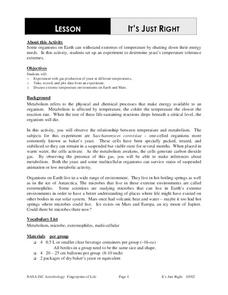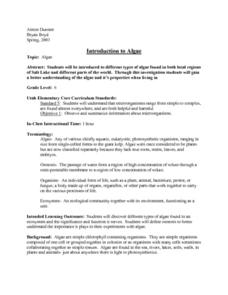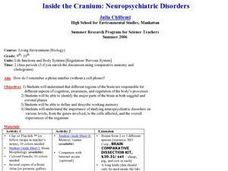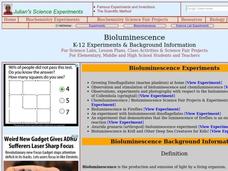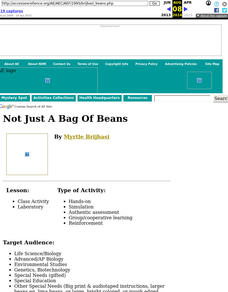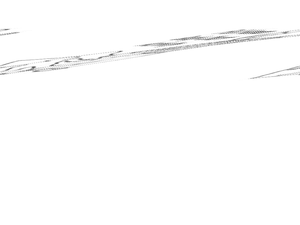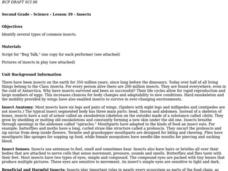Curated OER
Genetic Changes
In this genetic change activity, high schoolers will explore the changes that can occur in DNA including point mutations and chromosomal mutations. This activity has 11 multiple choice questions.
Curated OER
Microbiology Lesson Plan Aseptic Technique
Students examine the importance of aseptic technique, become familiar with media plates, and general microbiology techniques. They study the benefits and dangers of bacteria and other microorganisms in their lives.
Curated OER
Water and Diffusion
In this water and diffusion activity, students will explore the characteristics of water and the water molecule. Students will also answer questions about diffusion and the movement of materials due to concentration differences. This...
Curated OER
DNA and Genes
In this DNA activity students will label the 6 parts that make up DNA and review the process of replication of DNA. This activity has 6 matching and 5 fill in the blank questions.
Curated OER
Muscles for Locomotion
In this muscles activity, students review the characteristics of the 3 types of muscles: smooth, skeletal, and cardiac. This activity has 7 matching and 4 short answer questions.
Curated OER
Non-Seed Vascular Plants
In this non-seed vascular plant instructional activity, students review the characteristics of sporophytes, lycophytes, sphenophytes, and pterophytes. This instructional activity has 19 fill in the blank, 4 true or false, and 2 short...
Curated OER
Molecular Evidence for Evolutionary Relationships
Students compare the amino acid sequences in cytochrome-c for a variety of organisms and use this information to infer evolutionary relationships. Students investigate the role of homeobox genes and what this indicates about the...
Curated OER
It's Okay to Exhale: Photosynthesis and Cellular Respiration
Students will observe the differences between photosynthesis and cellular respiration. Then they observe the links due to climate changes and relate how climate change affects their lives.
Curated OER
It's Just Right
Young scholars conduct an experiment to determine the temperature tolerance of yeasts. In this biology lesson plan, students collect data and compare them by plotting graphs. They explain how extreme temperatures affect organisms.
Curated OER
Introduction to Algae
Students explore different types of algae found in both local regions of Salt Lake and different parts of the world. They discover different types of algae found in an ecosystem and the significance and function it serves.
Curated OER
Photosynthesis
In this biology worksheet, students explain where the energy of food originally came from. Then the explain one of the principal chemical compounds that living things use to store energy. Students also describe how ATP and ADP differ and...
Curated OER
Sea Urchin Embryology
Students explore the process of evolution. They examine examples of how homeotic genes may work and obtain gametes. Using a microscope, students observe the fertilization of sea urchins. They video tape the process and write a...
Curated OER
GenEng
Students investigate the process of genetic engineering. In this genetic engineering lesson plan, students use paper models of DNA and plasmid bacterium to investigate the process of replicating DNA, splicing genes from DNA, and...
Curated OER
Geneticist for a Day
Young scholars discuss and compose a document discussing the transmission of the Huntington's gene- dominant or recessive, sex linked, etc. Additionally, they ought to consider Dr. Wexler's own odds for contracting the disease.
Curated OER
Basic Vitamins: Water-Soluble and Fat-Soluble
Students examine vitamins and study their functions and food sources. They research what happens to vitamins when foods are overcooked. They prepare a microwaveable vegetable quiche.
Curated OER
Inside the Cranium: Neuropsychiatric Disorders
Learners analyze different regions of the brain which are responsible for different aspects of cognition, awareness and regulating the body's process.
Curated OER
Bioluminescence
Students differentiate chemiluminescence from bioluminescence. In this biology lesson, students explain how fireflies and other animals emit light. They discuss the applications of engineered bioluminescence.
Curated OER
Biology - Virus Modeling
High schoolers research one of the many types of viruses. They create a 3-D model of the virus they researched with graphics software.
Curated OER
Bad Algae!
Students explore algal blooms. In this ecosystem and health lesson, students define and describe harmful algal blooms, then discuss ways in which the impact of these algal blooms could be reduced. Students work in groups to research...
Curated OER
Not Just a Bag of Beans
Learners determine the types of natural selection and variation that exists in a population, using beans.
Curated OER
Biomechanics of Sports
Students examine the body's major organ systems and how they function and influence each other. They examine how the human body moves when involved in sports.
Curated OER
How Does a Green Plant Grow?
Students of all ages can explore the question "how do seeds grow?", design an experiment to answer the question, predict the outcome of the experiment then conduct the experiment.
Curated OER
Human Body Activity
In this human body learning exercise, 2nd graders experiment making a full-sized human body portrait. Students discuss the human body organs and their functions. Students follow and complete 8 precise directives in making a human body...
Curated OER
Insects
Second graders brainstorm and identify several types of common insects. They play bug bingo, building bugs and an insect tree, observing real insects in the classroom and examining some of the things insects make.










